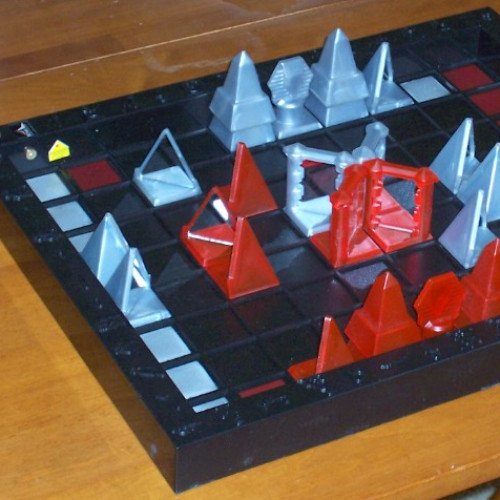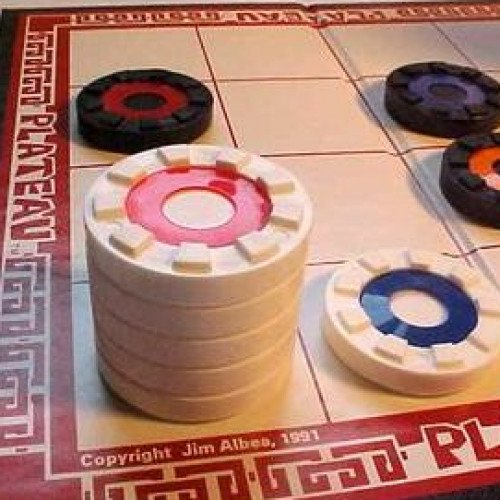KHET VS PLATEAU

KHET
Khet is a chess-like abstract strategy board game using lasers that was formerly known as Deflexion. Players take turns moving Egyptian-themed pieces around the playing field, firing their low-powered laser diode after each move. Most of the pieces are mirrored on one or more sides, allowing the players to alter the path of the laser through the playing field. When a piece is struck by a laser on a non-mirrored side, it is eliminated from the game. Under its original name, the game was a Mensa Select Award winner. Its name was changed on September 15, 2006. The new game retains the same rules of gameplay, but has a different design, including a new color scheme and a new box design. Under the new name, the game was one of five finalists for the 2007 Toy of the Year award. Professor Michael Larson and two students, Del Segura and Luke Hooper, designed the game as a class project at Tulane University. (Professor Larson is now at the University of Colorado.) The game was introduced to the public in the spring of 2005, and was first brought to prominence at the New York Toy Fair of that year. The game was first shipped in October 2005. The first Deflexion World Championship was held December 10, 2005 under the dome at the Massachusetts Institute of Technology. Registration was free, and the participants competed for cash and other prizes. The winner was an MIT student. Under the new name, Khet, the first Regional Championship took place in April 2006 at the famous Café du Monde in the New Orleans French Quarter. Twenty-four participants competed for a number of prizes. As a special bonus, the Eye of Horus beam splitter was unveiled at the very end, and used by each player in the championship game. Khet was also featured on a recent episode of the HGTV show "I Want That: Tech Toys". Footage from the New Orleans tournament was included in the broadcast. In 2017 a company called "Thinkfun" acquired the license for the now out of print Khet 2.0 and rebranded the game "Laser Chess". Now with a new, modernized scifi look, it brings the exact same rules and feel of Khet 2.0 back to the table.
Statistics for this Xoptio

PLATEAU
Plateau is a two-player abstract strategy board game invented by Jim Albea. The game was developed over a two-year period culminating in its present form on May 12, 1986. The original name for the game was Pinnacle, but it was discovered that an older board/card game had that name, so around 1989 the name was changed to Plateau. From the 1980s through the 1990s Plateau was played at Science Fiction conventions mostly in the Southeastern United States. From the 1990s to the present, the game is played live at an online game site and via email. In 1997 a computer implementation of the game was created which facilitates email play and has a computer robot. Onboarding is adding one new piece to the play. This new piece can be placed anywhere that doesn't directly harm an opposing piece. For instance, you can onboard to any blank square or on top of any of your own pieces. The majority of Plateau moves are onboards. Instead of Onboarding or Moving, a player can choose to spend his turn exchanging prisoners. Prisoners are exchanged using the point values of the pieces. A simple value-for-value system is used. Since the pieces range in value from 1 point (for the mute) to 21 points (for the Ace) there are usually several combinations and options available for the players. The player initiating the exchange selects the pieces he wishes to exchange. These pieces will all add up to some point value. The responding player then has four options depending on the point values of the prisoners that he holds.